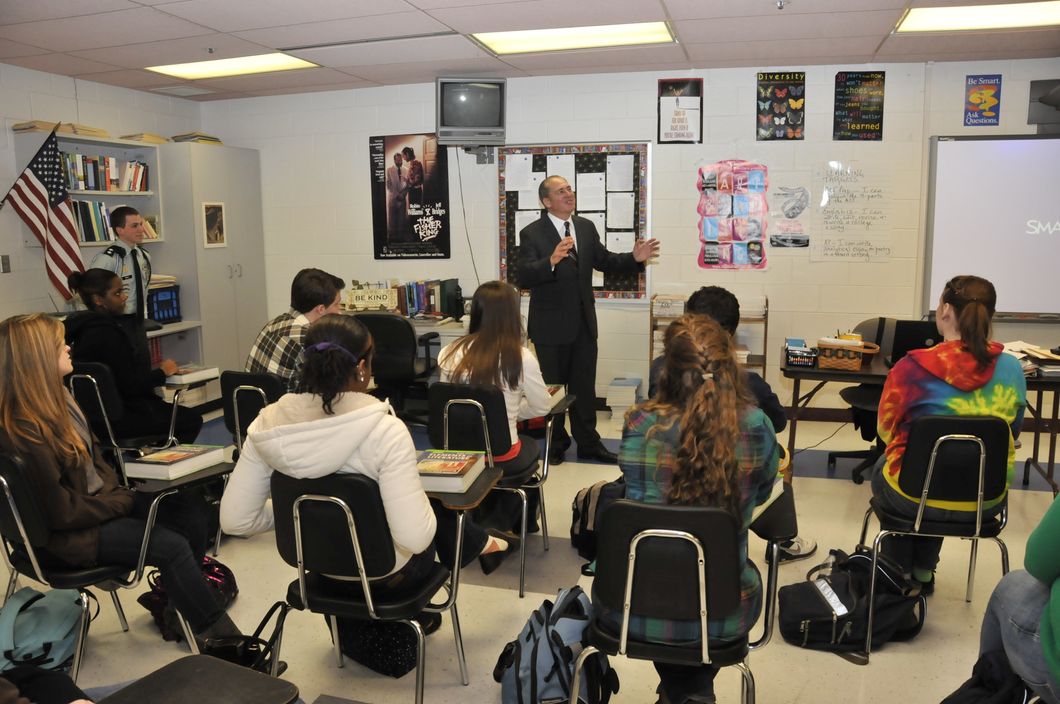Whether you're currently in high school, or graduated 20 years ago, you've probably heard complaints that school is full of useless information that won't matter once you are in the "real world." While I don't agree that everything taught in high school is useless, I still believe the system is flawed.
Here are three subjects I think American schools should focus on to better prepare their students for life after (and even before!) graduation.
1. Sex Education
Like, actual comprehensive, medically accurate, and non-judgmental sex education. Did you know that only 17 states require information about contraception be taught during sex education? Some don't even require sex ed at all! Flashback to sophomore year of high school, my health class was told we would "talk about condoms and birth control and all of that," but we never did. Kids in my high school had all kinds of misinformed ideas. Notions like you can't get pregnant in a hot tub because the heat kills the sperm (lol what?!) or that you should wear two condoms to be extra safe. Actually, wearing two condoms increases friction and is more likely to result in a breakage.
I guarantee you almost nobody knew what an IUD is. Also, a woman who got pregnant as a 16-year-old came into my class to tell us that "sex is beautiful, but only between a husband and wife." So I guess sex for everyone who isn't straight, doesn't want to wait until marriage or doesn't want to get married at all is just ugly and out of luck, folks.
2. Mental Health Education
Maybe I'm biased because I'm a psych major or because 10 of millions of Americans are affected by at least one mental illness in given year, but hey. Several of my college friends and acquaintances have said that they never had any education on mental illness until their introductory psychology course freshman year. As early as middle school, I had people come to me with feelings of worthlessness or other symptoms of depression, reveal that they self-harmed, or confess that they might have an eating disorder. I knew these things weren't good, but I was also fairly ignorant. I really didn't know to respond or even understand what they were going through.
"Maybe you should talk to someone," or "you don't need to do that, you're so pretty" were usually my responses, if I had any at all. Even though I did feel concern, at the same time I was like, "Why would anyone do that? That's so weird." Or, "What's there to be depressed about?" Mental illness can be just as serious as physical illness and is not necessarily a reflection of a person's character. I think everyone should be taught about common mental illnesses, recognizing signs and symptoms in themselves and others, what resources are available for treatment, and how to talk to those who may be struggling.
3. Financial Literacy
To my high school's credit, a course on financial literacy was required, and I did learn how to write a check, how to dress for a job interview, and how renting an apartment works (sort of). But as someone who will have a bachelor's degree and will be living on her own in less than a year, there's a lot I probably should know that I don't. My ex-boyfriend made fun of me for being hesitant to get a credit card, because I was scared of getting in over my head. Every time I fill out a tax form, I cross my fingers and hope I'm answering correctly. How much should I put on a downpayment for a car? I didn't know the answer until I Googled it last month. How do I apply for a loan? I guess I'll Google that too.
Even though I have savings goals for myself and am trying to prepare for the expenses of moving out, I don't feel confident in the financial realm at all. I feel like someone could easily take advantage of me and I wouldn't know the difference, which is scary.
You always have the opportunity to do your own research and ask those with more experience, which I highly recommend, but the American school system could do a better job of preparing you for the situations you will undoubtedly face as an adult.






















